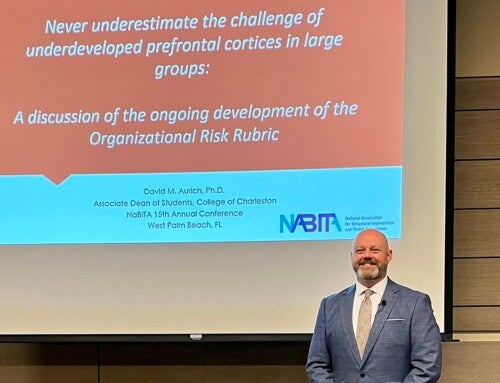The South Carolina Department of Administration’s Division of State Human Resources shared a memorandum on March 9, 2020, with human resources directors across the state regarding the 2019 novel coronavirus (COVID-19).
The memorandum addresses some of the common questions the division has received regarding COVID-19. State employees should stay informed on how to protect themselves and their workplaces from COVID-19 by regularly checking the South Carolina Department of Health and Environmental Control (DHEC) website.
Should our agency close its offices to prevent the spread of COVID-19?
No. State government offices can only be closed at the direction and order of the governor. At this time, Governor McMaster and DHEC have advised citizens that they should avoid close contact with individuals who are sick and stay home if they are sick, but are encouraging citizens not to overreact. Employees who have flu-like symptoms or symptoms of respiratory illness should not come to work and should comply with all agency policies and practices for calling out of work sick.
Should our agency discuss COVID-19 with our employees?
Yes. To prevent misinformation and maintain open lines of communication, we recommend agencies discuss COVID-19 with employees. Specifically, relay the importance of hand-washing, advise employees to avoid close contact with people who are sick and remind managers of the agency’s sick leave policies and practices. Managers should emphasize that employees stay home from work when they are sick. Agencies are also encouraged to share the dedicated DHEC website regarding COVID-19 with employees.
Can supervisors send a sick employee home?
Yes. If an employee has symptoms of an infectious disease or virus such as COVID-19 or the flu, supervisors have the authority to require an employee to leave the workplace to prevent the spread of the illness to others. The Equal Employment Opportunity Commission’s guidance has indicated that sending employees home who display symptoms of infectious disease like COVID-19 or the flu is not a disability-related action.
Whenever practicable, supervisors should first seek approval of their manager, division director and/or human resources before sending a sick employee home. Symptoms of COVID-19 include fever, shortness of breath and/or a cough. Agencies should ensure that decisions to send employees home are made based on observable symptoms of illness and in a nondiscriminatory manner. Agencies and human resources staff should remind supervisors that the likelihood of an employee having COVID-19 in the workplace is extremely low, so they should make decisions based on observable facts and symptoms and not panic or fear. Practices should be based on presentation of symptoms and agencies should avoid discrimination based on travel history, race, ethnicity, etc.
If an employee believes his or her coworker is exhibiting symptoms, they should report their observations promptly to their supervisor, manager, division director or human resources.
Does the Family and Medical Leave Act (FMLA) apply to COVID-19?
Yes. If an employee or a qualifying family member contracts COVID-19, it constitutes a “serious health condition” under the FMLA, and a resulting leave of absence may be FMLA qualifying if the employee meets the other requirements to be covered by the FMLA. However, the FMLA generally does not cover staying home to avoid becoming sick.
Can our agency take employees’ temperatures to detect COVID-19 or the flu?
It is not recommended. The federal Equal Employment Opportunity Commission has indicated that taking an employee’s temperature is a “medical examination” under the Americans with Disabilities Act (ADA). Under the ADA, an employer may not conduct a medical examination unless it is job related and the employer has a reasonable belief the employee poses a direct threat to the health and safety of the individual or others that cannot be eliminated or reduced by a reasonable accommodation. Due to these requirements, employers should not take the temperature of employees. Additionally, the Center for Disease Control (CDC) has advised that individuals can be contagious without running a fever, so the benefits of taking an individual’s temperature are limited.
Can our agency require a doctor’s note before sick employees return to work?
It is not recommended. The CDC has advised against requiring a note from a health care provider to validate an employee’s ability to return to work even if the employee has been sick with respiratory illness. This is due in part to the fact that health care facilities and offices may be extremely busy and not able to provide documentation in a timely manner.
If an employee is quarantined, can he use sick leave?
Yes. If a health professional recommends quarantine for a state employee who accrues leave, the employee can use accrued sick leave pursuant to HR Regulation 19-710.04(B)(2), which permits an employee to use sick leave due to “exposure to a contagious disease such that presence on duty could endanger the health of fellow employees.” If a health care professional recommends quarantine for an employee in a non-leave–accruing position, a human resources consultant should be contacted to discuss options.
Can an employee who is on leave related to COVID-19 be advanced sick leave?
Yes. HR Regulation 19-710.03 permits an agency to advance up to 15 workdays of additional sick leave to an employee in extenuating circumstances, which does include contracting or being quarantined as a result of potential COVID-19 exposure.
Should our agency provide face masks to our employees?
Not unless the employees care for exposed and/or infected individuals. The World Health Organization states that face masks create a false sense of security and should be used by only (1) persons with COVID-19 symptoms and (2) health workers and caretakers tending to infected persons. Currently, the CDC does not recommend face masks for uninfected persons.
Can an employee refuse to come to work out of fear of contracting COVID-19?
Under Section 13(a) of the Occupational Safety and Health Act (OSHA), employees can only refuse to come to work if they believe they are in imminent danger. Imminent danger is defined very narrowly. If an employee refuses to come to work due to fear of COVID-19, the agency should contact their human resources consultant.
Do the requirements of HIPAA still apply when we are trying to prevent the spread of COVID-19?
Yes. The federal government has published reminders to all employers that they must comply with the protections of the Health Insurance Portability and Accountability Act (HIPAA) during the COVID-19 outbreak. It is recommended that when discussing COVID-19 with supervisors and managers, agencies remind them of the requirements of HIPAA.
What should our agency communicate to employees if there is a presumptive or confirmed case among one of its employees?
The employee and his/her family’s privacy should be protected to the extent possible, and his or her identity should not be disclosed. Management should maintain confidentiality as required by federal and state law, including but not limited to HIPAA, the FMLA and the ADA. Management should consult with their agency general counsel to determine what information regarding an employee’s exposure and/or condition is releasable. Employees exposed to a coworker with confirmed COVID-19 should refer to DHEC’s website and its links to the CDC guidance for more information.
Managers should work with their workplace safety contacts and DHEC officials to stay apprised of information regarding transmission of the illness and precautions that should be taken to reduce the spread of influenza or any other contagious disease in the workplace. Managers should treat this as they would any other illness in the workplace.
Should agencies offer telecommuting to prevent the spread of COVID-19?
Telecommuting is a flexible work arrangement that allows an employee to work at home or at another satellite location (which is linked, usually electronically, to a central office) during all or some portion of the work week. S.C. Code Section 8-11-15(B) authorizes state agencies to utilize telecommuting for greater workplace efficiency.
The appropriateness of a telecommuting arrangement will depend on the unique circumstances of each agency and the employee. The Equal Employment Opportunity Commission has advised that telecommuting is an effective infection-control strategy, but widespread implementation of telecommuting is not necessary in South Carolina at this time. If an employee is quarantined due to exposure to COVID-19, agencies should consider whether an employee may telecommute. Additionally, if employees are at a high risk for complications from COVID-19, agencies may offer telecommuting, where appropriate, as an accommodation to reduce the risk of exposure and infection. Agencies with questions regarding telecommuting should consult DSHR’s guidance on it (https://www.admin.sc.gov/dshr/model_policies) or contact their human resources consultant.
The Department of Administration will continue to closely monitor developments related to COVID-19 and provide additional guidance as needed.



